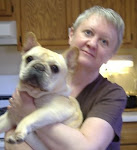

I'm on a million mail order mailing lists, and I know why. I used to work for a mail order company and remember well how the mailing list manager would specify customer characteristics when renting other companies' mailing lists: the customer must live in one of these zip codes, have ordered at least $50 worth of merchandise in the past 6 months, not have a (fill- in-the-blank ethnic) surname (sorry, but it's true), and so on.
I was on the mailing list for every catalog of fat girls' clothes in the United States. Fat look? We got it.
But in the 6 months or so, I've begun receiving new catalogs. Thin look? We got that, too.
This morning I threw out a Victoria's Secret catalog that had entertained my husband more than it did me (I have never, ever bought anything from VS). This afternoon I received an Intimate Apparel catalog from Old Pueblo Traders, which sells what my New England friends call "Meme" clothes (in Tennessee, that'd be "Meemaw"). I had to laugh at the contrast between the 2 catalogs.
Victoria's Secret swimwear is promoted with phrases like "Beach Sexy", "Very Sexy", and so on.
Old Pueblo's swimwear is promoted with phrases like "Chlorine Resistant", "Modest", and "Camouflages Hips".
I don't think either look is quite right for me. What do you think?












